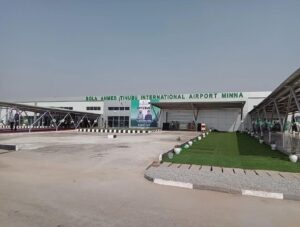 President Bola Tinubu is scheduled to inaugurate significant projects in Minna, including the newly renamed Bola Ahmed Tinubu International Airport, Minna, as well as an agro-processing zone and agricultural equipment.
President Bola Tinubu is scheduled to inaugurate significant projects in Minna, including the newly renamed Bola Ahmed Tinubu International Airport, Minna, as well as an agro-processing zone and agricultural equipment.
The Minna International Airport, originally inaugurated by former military Head of State Ibrahim Babangida in 1990, has undergone extensive renovations and improvements. Governor Umar Bago of Niger officially renamed the airport in honor of President Bola Ahmed Tinubu during a ceremony held on Friday. The airport now boasts a fully furnished domestic terminal, which was previously closed due to runway limitations.
The agro-processing zone project encompasses a sprawling area of approximately 2,000 hectares. Out of this, 1,000 hectares will be dedicated to drip irrigation and greenhouses, while another 1,000 hectares will be utilized for the processing of dairy products. This ambitious initiative aims to enhance the agricultural value chain and create employment opportunities.
Governor Bago highlighted the significance of the project, stating, “Niger State currently supplies an average of half a million cattle to both local and international markets daily. By leveraging the airport’s capabilities, we can transport frozen meat more efficiently, creating economic opportunities and bolstering the value chain.”
In addition to the airport and agro-processing zone, the development plans also include the construction of approximately 140 kilometers of water irrigation channels from Shiroro Dam. This long-term project, spanning 50 years, aims to enhance irrigation capabilities and support sustainable agriculture. The initial phase is slated for completion within the next few years.
Furthermore, as part of the visit, President Tinubu is scheduled to meet with two former heads of state, Ibrahim Babangida and Abdulsalami Abubakar, to discuss matters of mutual interest and national development.
The inauguration of these projects marks a significant milestone in the development of Minna, paving the way for increased economic growth, job creation, and enhanced agricultural practices in the region.

